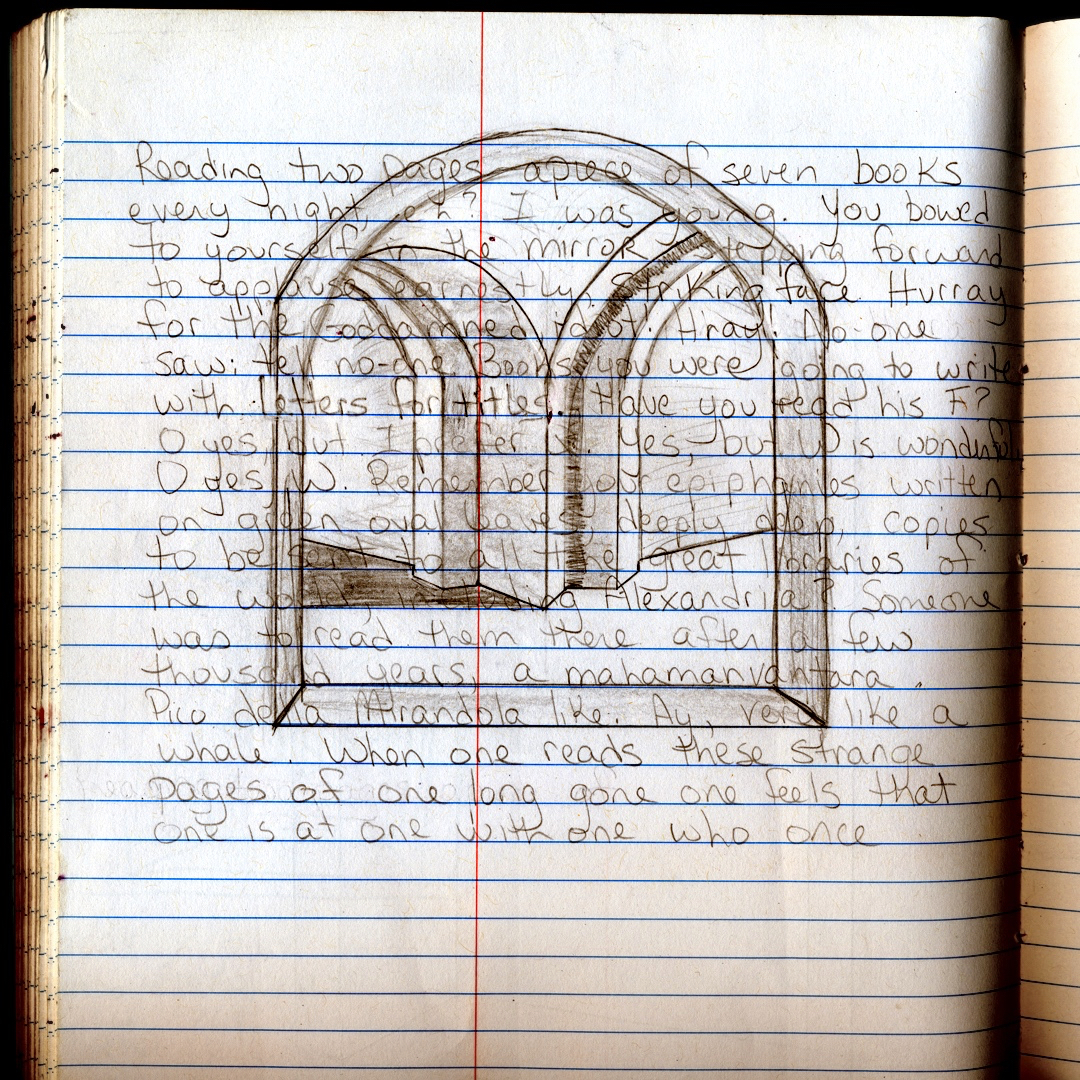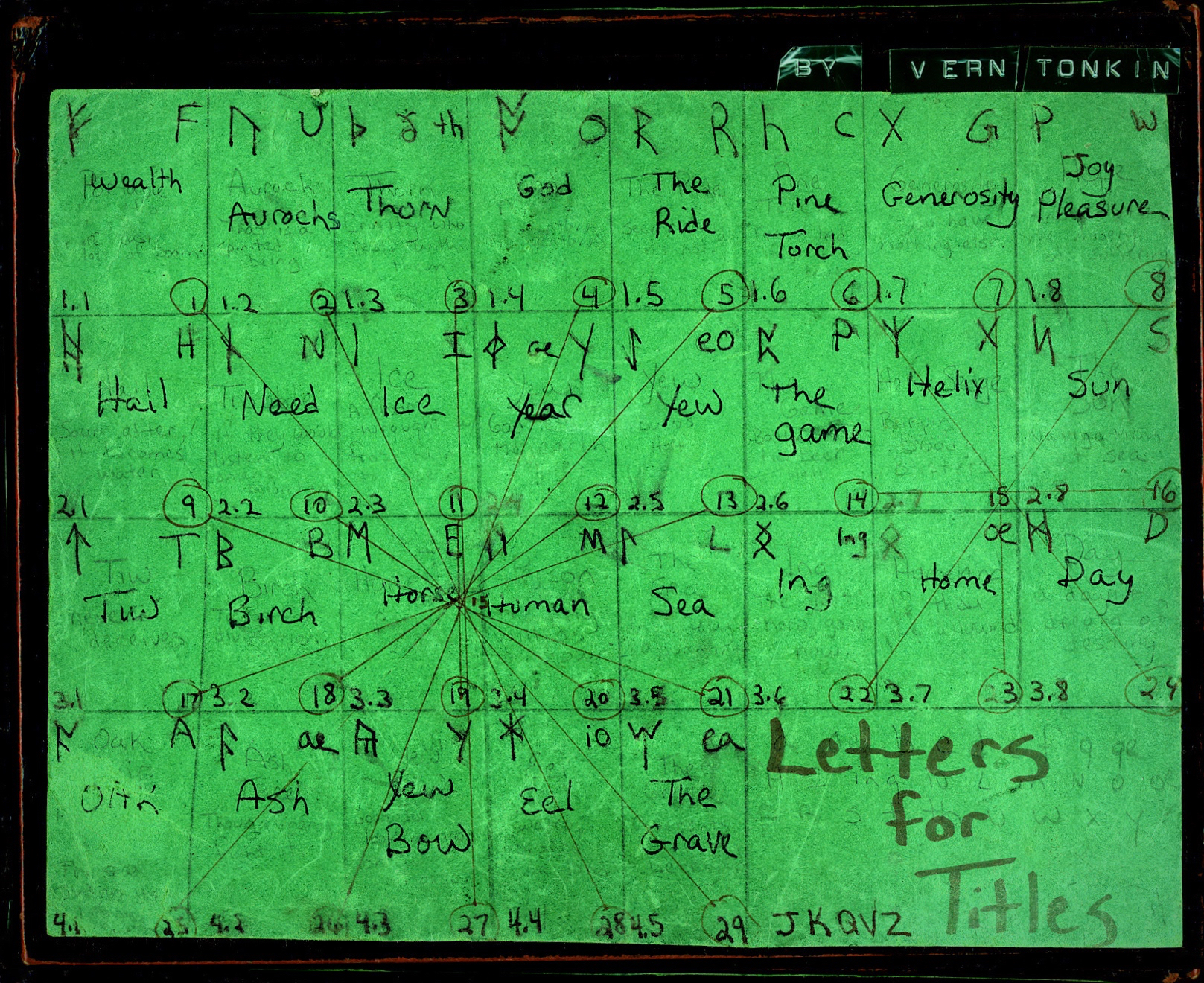
He did not disappear from sight, but stayed;
indeed he so impeded my ascent
that I had often to turn back again.

Alexander, Michael. Beowulf. Penguin Books, 1995. Penguin Classics.
Anderson, Earl R. “The Seasons of the Year in Old English.” Anglo-Saxon England, vol. 26, 1997, pp. 231-63, JSTOR, http://www.jstor.org/stable/44510523.
Baum, Paull F. Anglo-Saxon Riddles of the Exeter Book. Duke University Press, 1963.
Bierbaumer, Peter; Sauer, Hans; Klug, Helmut W.; Krischke Ulrike. Dictionary of Old English Plant Names. 2007-2009, http://oldenglish-plantnames.org.
Bischoff, Bernhard. Latin Palaeography: Antiquity and the Middle Ages. Cambridge University Press, 1990.
Boethius. The Consolation of Philosophy. Bobbs-Merrill, 1962. vol. 86.
—. The Old English Boethius : With Verse Prologues and Epilogues Associated with King Alfred. Harvard University Press, 2012. vol. 19.
Borges, Jorge Luis. “The Kenning.” The New Yorker, January 26, 1976, pp. 35-36.
Bosworth, Joseph. “An Anglo Saxon Dictionary Online.” edited by Thomas Northcote Toller et al., Faculty of Arts, Charles University, 2014. https://bosworthtoller.com.
Brady, Caroline. “The Old English Nominal Compounds in … More
 Spanish was my first language but I was a toddler when my family moved to the States, where my world became English only, that I grew up as an English speaker and thinker and struggled learning Spanish when I had the chance in college. I got a pity D- in my third year of Spanish because my Argentine professor couldn’t fathom how a girl from Peru could only grasp the basic language of a baby, and she just couldn’t bring herself to fail a South American as I deserved. In Spanish I can understand everything and say nothing much. I do know all the swear words. So.
Spanish was my first language but I was a toddler when my family moved to the States, where my world became English only, that I grew up as an English speaker and thinker and struggled learning Spanish when I had the chance in college. I got a pity D- in my third year of Spanish because my Argentine professor couldn’t fathom how a girl from Peru could only grasp the basic language of a baby, and she just couldn’t bring herself to fail a South American as I deserved. In Spanish I can understand everything and say nothing much. I do know all the swear words. So.
In grad school, I needed one more year of Spanish to get a Ph.D., or I could learn Old English. I was there to study temporality, as much as a very generous and forward thinking English department would let me, and another South American, an Argentine I love… More

ᚠ
byþ frofur. fira gehwylcum.
Sceal ðeah manna gehwylc. miclun hyt dælan.
gif he wile. for drihtne domes hleotan ᛬᛫
It is a consolation to each one of us,
Though each of us must distribute it generously,
If we will before God, cast lots for judgement.
ᚢ
byþ anmod. and ofer hyrned.
fela frecne. deor feohteþ. mid hornum.
mære morstapa. ꝥ is modig wuht ᛬᛫
It is singleminded and overhorned
Fiercely dangerous wild beast, fights with horns
Famous moor-stepper; that is a spirited being.
Þ
byþ ðearle scearp. ðegna gehwylcum.
anfengys yfyl ungemetun reþe.
manna gehwylcun. ðe him mid resteð ᛬᛫
It is severely sharp for all of the attendants
Laying hold of it is evil, with unmet cruelty
For anybody who rests with them.
ᚩ
byþ ordfruma. ælcre spræce.
wisdomes wraþu. and witena frofur.
and eorla gehwam. eadnys and to hiht ᛬᛫
 A is always for apple. B is for a lot of stuff. Ball, bear, boat, banana, so many B things. Very early we learn from the one to the infinite is but a step.
A is always for apple. B is for a lot of stuff. Ball, bear, boat, banana, so many B things. Very early we learn from the one to the infinite is but a step.
The Old English Rune Poem is an alphabet book. It looks like an alphabet book, but like a modern alphabet book there’s infinitely more to it, if you look close. Every stanza of the poem describes a letter, a rune. In Old English the word rune means secret. The secret is these letters weren’t just for writing. In secret, when nobody was looking, people could carve the runes into bits of wood and cast lots with them. Find out their fates. Answer a few questions. Solve some problems. They could do this because each stanza of the Rune Poem, gives a little bit of wisdom, a little picture of life, sometimes a warning. Always in the form of a riddle. The … More
